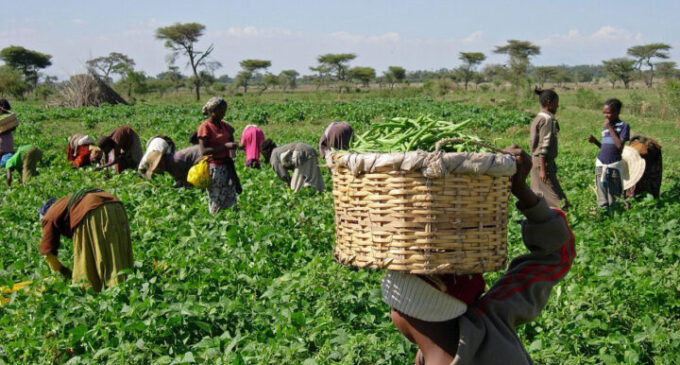Agriculture as the engine of sustainable industrialisation in Edo state

Edo State isn’t just any place; it’s a treasure trove with deep historical roots. Its capital, Benin City, once the administrative epicentre of the vast Benin Kingdom, has captured imaginations for centuries. A poignant book, “The Benin Massacre” by Captain Alan Boisragon, a survivor of the 1897 ‘Benin Massacre,’ painted a vivid picture of the kingdom’s bountiful produce and the industries that thrived along the Benin River and its main distributaries. These waterways, which weave into the Atlantic, once hummed with activity. Today, the fertile expanse of Edo continues to play a crucial role in Nigeria’s agricultural landscape.
From Oil to Soil
In recent years, oil took over as the primary money-maker in Nigeria, with the Federal government collecting revenues and dolling out monthly allocations to all federating units. This newfound wealth being shared from Abuja, heralded a promise of urban prosperity. Rural dwellers who were once dedicated to tilling the land and feeding the nation, found city life, with its allure of white and blue-collar jobs, increasingly captivating. The ensuing rural to urban migration of the productive rural youths who were hitherto farm hands, contributed in no small measure to the decline in agricultural productivity. The most affected sector is cash crop farming, this is because it requires more time and effort to nurture than is required for subsistence crops like cassava, yam, or maize.
But why leave behind farming that was once the backbone of the region’s prosperity? It is now crucial to refocus on Edo’s agricultural sector as a necessary gateway to a sustainable future.
Sustainability: A New Farming Roadmap
It is not just about returning to the land; it’s about doing so sustainably. While cash crops cultivation and their export can contribute to economic development of Edo state, it can also lead to adverse environmental challenges. Traditional farming methods, such as slash-and-burn, harm our planet and are unsustainable. It’s time for us, as a state, to double-down on the roadmap for training farmers in eco-friendly practices. These include approaches like biological pest control, planting quick-growing and pest-resistant crop varieties, and using soil-enriching, weed-suppressing cover crops, such as legumes, beneath cash crops. Adopting these methods will ensure the ecological balance of the land while also providing sustainable yields and income for farmers in the long run. As a complementary initiative, the Edo State government should continue the good work it has already started, by training, encouraging, and assisting small holder farmers in securing international certifications for producing cash crops sustainably. An example is palm oil, sourced from sustainably cultivated plantations that adhere to credible global standards. These certifications, recognized by entities such as the Roundtable on Sustainable Palm Oil (RSPO) – in the case of palm oil, will enhance the acceptance of Edo’s cash crops in the international market, helping to quickly establish a market share for Edo State-sourced farm produce.
THE PROMISE OF EDO’S AGRICULTURAL EXPORTS
A Wealth of Opportunity
Imagine turning the state’s rich soil into a piggy bank, packed with valuable crops for export. I invite you to think about the doors it could open for local industries!
Take palm oil for example, a close look at the world palm oil trade for 2022 for example shows that this is a US$55 billion export market, with Indonesia as the largest exporter taking in over US$27 billion in palm oil exports. According to a report by the consulting firm PwC, in the early 1960s, Nigeria was the world’s largest palm oil producer with a global market share of 43%. However, today, it is the 5th largest producer with less than 2% of total global market production of 74.08 million MT. Nigeria which used to be the leading palm oil exporter in the world is now a net importer of palm oil with its huge local demand. Edo state therefore has the potential to both bridge local demand and become an export base for forex-earning cash crops such as palm oil.
The Seed Money for Progress
Edo’s new plantations can be the launchpad for agricultural-driven industrial evolution. By placing a renewed emphasis on farming and championing exports, we have a tangible solution to curb Nigeria’s heavy reliance on food imports. This essential influx of foreign exchange from agro-exports will also help to tackle our pressing forex crisis and ameliorate our persistent balance of payment challenges –which is at the root of our current economic woes.
The ripple effect of this agricultural rejuvenation will go deep into Edo’s more remote regions. As farms prosper with increased productivity, they directly elevate the incomes of our hard-working farmers. This surge in rural purchasing power leads naturally to a heightened sense of commerce and a yearning for better quality of life. The increased commercial activities in these areas will also create demand for goods and services. An uptick in demand will in turn sow the seeds for a rural mass market and the various cottage industries to support it.
But the cycle doesn’t end with immediate prosperity among farmers. The wealth accumulated by farmers doesn’t just benefit them – it feeds back into our state and National economies. The state government through well-crafted messaging via mass communication channels will strive to entrench a culture of savings over that of mass consumption. If done effectively with incentives to hilt, farmers surplus earnings, will be channelled into savings. This will bolster our banking sector. A strong financial system, in turn, is positioned to offer credit to aspiring entrepreneurs and more farmers. Repeat this over a period, and you create a continuous loop of growth and reinvestment, leading to a more prosperous future for Edo State.
LAND RIGHTS IN EDO: EMPOWERING FARMERS THROUGH TENURE SECURITY
Soil is Gold
Land isn’t just dirt; it’s a farmer’s bread and butter. Ensuring long-term ownership can inspire farmers to invest more in their lands as their property and increase productivity for themselves and their own prosperity rather than for the landlord or rent seeker as it is today. How to do this?
Government’s Hand in the Soil
Edo state government has the potential to transform agriculture by acquiring and preparing vast swathes of its abundant arable land using mechanized methods. By issuing long-term land rights and acting as guarantors for farmers seeking agricultural improvement loans, the government can significantly boost agricultural productivity.
A key area for state intervention is agricultural infrastructure. The establishment of new river basin authorities, alongside the existing ones, would pave the way for strategic projects such as dams, water reservoirs, and expansive irrigation systems. These controlled water systems can ensure year-round agricultural activities, reducing our millennia-old dependence on monsoon rains. During the execution of these civil works, the state could efficiently utilize local labour resources, particularly farmers. By organizing and mobilizing them under a temporary salary scheme, the state can engage these farmers in land preparation and support infrastructure projects during the typically idle dry season. This approach not only breathes life into the land but also fosters a more productive and self-sufficient agricultural sector.
BOOSTING PER CAPITA AGRICULTURAL PRODUCTIVITY: THE FOUR PILLARS
Improving Edo state’s agricultural productivity requires the active participation of the state government. This means significant commitment by political leadership, state directed investments and well-crafted policy efforts. Here, I propose four key pillars to boost per capita agricultural productivity. While not exhaustive, they serve as signposts to begin with:
Extension Services: Filling in the Blanks- The state govt, working with the federal MDAs and research institutes should set up robust extension services in Edo. These should be thought of as a helpful neighbour who knows all the farming secrets. Their mandate is to improve productivity by many folds. This they will do by showing farmers how to get the most out of their land using proven best practices and practical knowledge transfer to farmers – learning-by-doing.
Quality Seeds: The Right Start –research and experience has shown that with the right seeds and hybrid crops, a farmer’s yield can double or triple. The time to maturity and crop yield can also be significantly reduced, ensuring an early return on investment. It’s like giving an artist the best paints; the result is a masterpiece.
Easy Credit: Watering the Seeds of Growth – With secure land rights, farmers can get the loans they need to expand, as easily as turning on a tap. The Government must also look at providing credit insurance to farmers. This will provide credit guarantees to banks who want to give competitive credit to farmers.
Guaranteed Markets: When farmers are assured of buyers, they are more likely to plant ambitiously and aim for higher yields. This assurance acts like a safety net, fostering confidence akin to knowing you’ll be caught when you leap. To make this practical, the Edo state government can act as a buyer/off taker of last resort in agreements with smallholder farmers’ cooperatives. This approach guarantees the sale of produce even before planting begins, instilling confidence in farmers to invest and expand their crop production.
A VISION FOR EDO: AGRICULTURE AS THE ENGINE OF SUSTAINABLE INDUSTRIALIZATION
The Two-Way Street– Agriculture and industry don’t exist in separate lanes; they form a dynamic two-way street, each propelling the other’s momentum. As emphasized earlier, the foreign exchange earned from agricultural exports will enhance our ability to import the technology and machinery essential for Edo state’s initial industrialization.
A logical first step is agro-processing, adding value to our agricultural produce before export. This aligns seamlessly with the current Edo state government’s ambition to construct a new deep seaport – The Benin River Port. Once operational, this port is poised to be Africa’s premier hub dedicated almost exclusively to the export of agro-allied products. Over time, the vicinity around the port is envisioned to host industrial parks focused on processing agricultural produce to the highest international standards for export. This shift echoes the golden era from the 15th to the late 19th century when the banks of the Benin river and its distributaries thrived with agro-processing factories, though they were more modest and less technologically advanced. Government must now accelerate its commendable initiative and make this port a reality.
Learning from the Leaders– Other regions have transformed farming into industrial gold, and Edo can replicate this success by following a clear roadmap. A critical aspect of this strategy is to move away from the economic dogma of ‘Laissez-faire,’ as advocated by some international development institutions, which often advise against government intervention or subsidies in agriculture. To understand the importance of governmental support in agriculture, we must examine the economic histories of now-developed and rapidly developing countries during their growth phases. The transitions of Taiwan and China from agrarian to mass-production economies are particularly instructive. In both cases, agriculture catalysed rural proto-industrialization, boosting agro-productivity, and fostering agricultural diversification. This progress was not the result of market forces alone, as suggested by Adam Smith’s ‘invisible hand,’ but rather the outcome of deliberate state action.
The government’s role is crucial, not only in implementing the four pillars I previously outlined but also in investing in irrigation systems, agricultural infrastructure, and rural road networks to enhance plantation access. Eliminating rural logistical bottlenecks is essential to streamline the movement of farm produce to aggregation and processing centres. The government must also play a pivotal role in market creation, both domestically within Nigeria and internationally, focusing on semi-processed and processed cash crops. Edo state needs to strengthen its Ministry of Trade and Industry to collaborate with the Nigeria Export Promotion Council in international market creation. Initiating roadshows and international marketing campaigns is vital to generate interest in our products. Concurrently, mirroring the approach of Northeast Asian economies, we must emphasize quality control. The quality of our agricultural products should consistently match or exceed international standards. Farmers, agro-processors, and exporters who benefit from government support but fail to meet pre-agreed export quality standards should face sanctions. In summary, the government must be hands-on in ensuring that Edo state adopts policies centred on ‘Export Discipline’ (in Joe Studwell’s words), which is crucial to our agricultural production and trade strategy.
Conclusion
Edo stands at a crossroads, with paths leading to green plantations and buzzing factories. It’s time for politicians, policymakers, farmers, investors, and citizens to come together, planting the seeds for a prosperous future. Let’s envision an Edo State that’s not only greener but also richer in opportunities and innovations.
Mr Izedonmwen, an engineer, harbours a deep interest in developmental economics. Over the years, he has dedicated himself to the study of political economics, largely through self-education. He is focused on devising strategies to enhance the economic landscape of Edo State and Nigeria at large.
Views expressed by contributors are strictly personal and not of TheCable.


















There are no comments at the moment, do you want to add one?
Write a comment